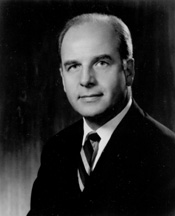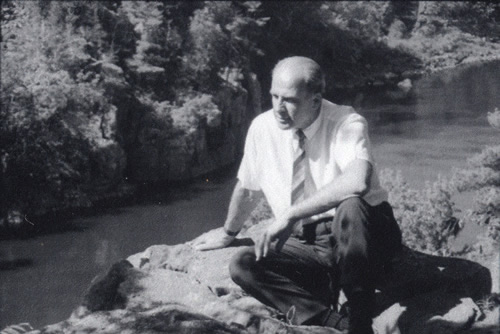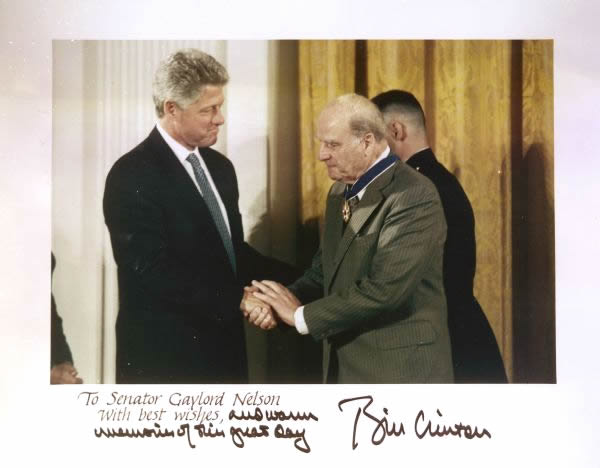Earth Day has become an annual event for remembering and enhancing the plight of our environment. The man who started Earth Day, however, both for that accomplishment as well as many others, deserves separate recognition on this, his birthday.

Gaylord Anton Nelson was born in the northern Wisconsin village of Clear Lake, on June 4, 1916 (died 2005). From the beginning, he admired two things about Wisconsin. First, he loved the beauty of the north woods, a forested landscape sequined with the reflective waters of innumerable lakes, ponds and streams. Second, he believed in Wisconsin’s “progressive movement,” in which the government used its power and resources to tackle the most pressing issues of the day.
Nelson received his law degree from the University of Wisconsin. After returning from his tour of duty in the Navy during World War II, he worked to build a coalition of Wisconsin’s leaders from both political parties in support of progressive ideals. He became a state senator and then served as Wisconsin’s governor for two terms during the late1950s-early 1960s. As governor, he championed an improved environment, fighting against pollution and habitat destruction. He re-organized the state’s many environmental and natural resource agencies into a single department that remains one of the finest in the country. He convinced the state to dedicate $50 million to acquire parks (using a one-cent tax on cigarettes), in remote as well as populated areas. For his efforts, he became known as the nation’s “conservation governor.”

Wisconsin elected him one of their two senators in 1962, a position he held for 18 years. He took his conservation-governor moniker to Washington and became the de facto conservation senator. He fought for both environmental improvements and for social welfare, acknowledging that the two are really one aspiration, not two. He said, “Environment is all of America and its problems. It is rats in the ghetto. It’s a hungry child in a land of affluence. It is housing not worthy of the name, neighborhoods not fit to inhabit.”
Nelson’s positive influence, reaching across political divides to unite a congress in support of a healthier environment, is reflected in a range of laws he sponsored or nurtured. He led efforts that passed, nearly unanimously, the Wilderness Act, the National Trails Act, the National Wild and Scenic Rivers Act, the National Environmental Education Act, and the National Environmental Policy Act. He also was the force behind strip-mining reform, the banning of phosphates in detergents, and vehicle fuel-efficiency standards.
But Nelson will always be remembered most for his idea to grow conservation from the grass roots. He wanted the leadership in Washington to understand that the people of the United States wanted a sustainable environment. So, working with college students, he and a small staff organized the first Earth Day in April, 1970. He only planned for one Earth Day, but, as we know, the idea caught hold and continues to grow as a global phenomenon (learn more about Earth Day here) .

For Earth Day and all his other actions on behalf of our environment, Gaylord Nelson is considered one of the most influential persons of the 20th Century. President Clinton bestowed the Presidential Medal of Freedom on Nelson in 1995, noting that “His work has inspired all Americans to take responsibility for the planet’s well-being and for our children’s future.”
Let’s heed his example.
References:
Nelson Institute for Environmental Studies. The Nelson Legacy. Available at: https://nelson.wisc.edu/about/nelson-legacy.php. Accessed February 15, 2020
Nelsonearthday.net. Meet Gaylord Nelson, founder of Earth Day. Available at: http://www.nelsonearthday.net/nelson/. Accessed February 15, 2020
The Wilderness Society. Gaylord Nelson. Available at: https://www.wilderness.org/articles/article/gaylord-nelson. Accessed February 15, 2020.
The Wilderness Society. Earth Day Founder Gaylord Nelson to Receive Medal of Freedom. Available at: http://www.nelsonearthday.net/docs/nelson_231-4_medal_of_freedom_press_release.pdfAccessed February 15, 2020.
